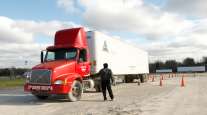Senior Reporter
US House Debates $1.75 Trillion Climate, Social Infrastructure Bill

[Stay on top of transportation news: Get TTNews in your inbox.]
A nearly $2 trillion bill representing key elements of President Joe Biden’s climate and social infrastructure agenda is under consideration before the U.S. House of Representatives.
Congressional Democratic leaders, aiming to advance much of the White House’s policies before the Thanksgiving holiday, took the step of setting up a vote on the bill as early as Nov. 18.
The Build Back Better Act primarily focuses on approving billions of dollars for social safety net programs pertaining to child care and elder care. The bill also is designed to pave the way for the adoption of alternative fuel technology, and severe weather resilience for mobility corridors and structures, such as bridges and tunnels.
Speaker Nancy Pelosi (D-Calif.) called on colleagues to support the bill: “As we approach the Thanksgiving holiday, we do so in a spirit of gratitude, with much to be thankful for, the vaccine and the ability to gather in-person with loved ones, families having another round of the historic Biden child tax credit in their pockets and a bipartisan infrastructure bill that will create millions of good-paying union jobs and rebuild our middle class.”
“Very soon, the American people will have an historic cause for celebration, with the passage of the transformative Build Back Better Act,” Pelosi added.

Castor
The speaker also has pointed to an update from the Congressional Budget Office showing certain projections are similar to the White House’s review of the bill. A CBO scorecard has been a requisite from a group of House moderates.
On policy, Democrats, such as Rep. Kathy Castor (D-Fla.), tout the bill as a major step to address concerns linked to climate action. “This is our moment. We have a once-in-a-lifetime opportunity to deliver on President Biden’s agenda to create millions of good-paying union jobs, to build resilience across America, and to protect future generations from the growing costs and risks of the climate crisis. Inaction is not an option. I’m ready to keep up the fight to help President Biden deliver this vision, for my daughters, for our economy, and for generations to come,” said Castor, chairwoman of the Select Committee on the Climate Crisis.
Biden and his team also are pushing for passage of the measure as they take a victory lap for enacting the $1 trillion infrastructure law. The Build Back Better Act, the president said, would advance his vision for long-term environmental benefits.
“With this infrastructure law, along with my Build Back Better plan, we’re going to kickstart new batteries, materials, and parts production and recycling; boosting the manufacturing of clean vehicles with new loans and new tax credits; creating new purchase incentives for consumers to buy American-made, union-made clean vehicles, like the electric Hummer,” said Biden at an event in Detroit, Mich., on Nov. 17.

Manchin
If the social infrastructure budget bill is approved by the House, it will be considered in the Senate through a fast-track reconciliation process. That procedural step in the Senate requires a majority vote for a bill’s passage. Yet, it remains unclear if Senate Democrats have total support from their 50-member caucus. Sens. Joe Manchin of West Virginia and Kyrsten Sinema of Arizona, who have pushed back on big-ticket spending proposals, are poised to play an outsized role in determining a final package’s provisions.
Senior Republicans, meanwhile, continue to oppose the Build Back Better Act. They sound the alarm on approving a multitrillion dollar measure at a time when supply chain woes are disrupting the flow of goods. As Senate Minority Leader Mitch McConnell (R-Ky.) argued, “There [are] all kinds of tax increases that would hit major employers, Main Street small businesses, and American families.”
Added McConnell: “Nonpartisan experts have confirmed the Democrats’ bill would completely break the president’s promise not to raise ‘a single penny more’ in taxes on middle-class households.”
Want more news? Listen to today's daily briefing below or go here for more info:




